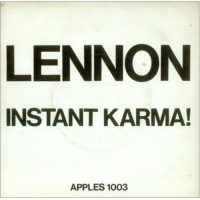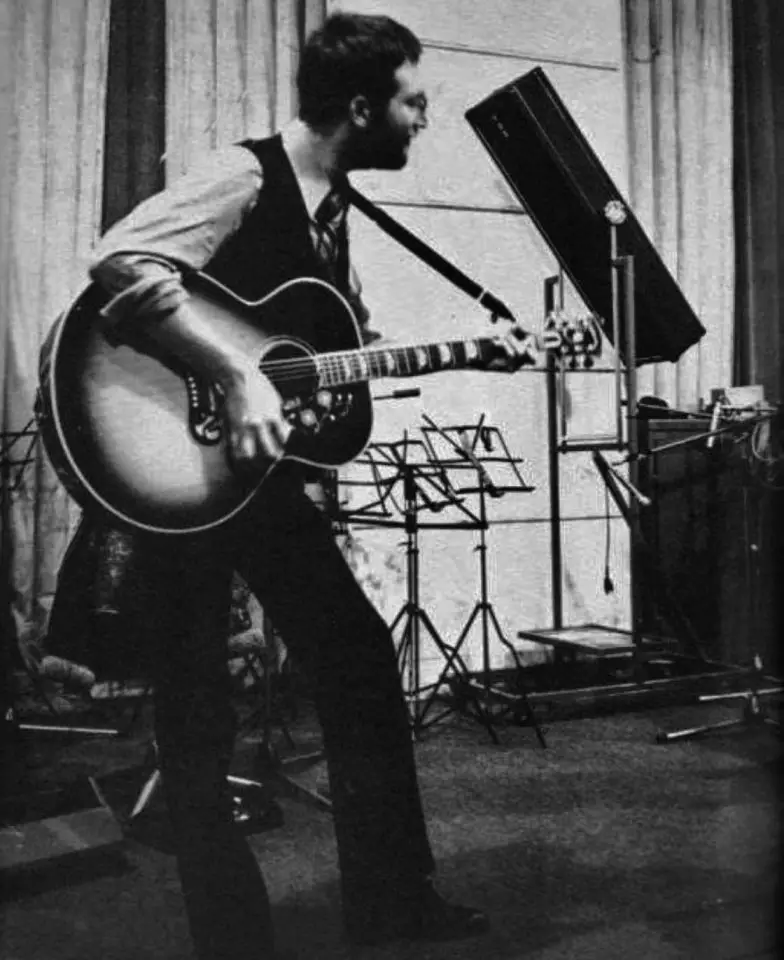
Recorded: 27 January 1970
Producers: John Lennon, Yoko Ono, Phil Spector
Released: 6 February 1970 (UK), 20 February 1970 (US)
Available on:
Power To The People – The Hits
Live In New York City
Personnel
John Lennon: vocals, acoustic guitar, piano
George Harrison: acoustic guitar, piano
Klaus Voormann: bass guitar, piano
Alan White: drums, piano
Mal Evans: backing vocals, chimes, handclaps
Yoko Ono, Allen Klein, Billy Preston and others: backing vocals
‘Instant Karma!’, John Lennon’s third non-Beatles single, was written and recorded on the same day, and released just 10 days later. Upon its release he told the press that he “wrote it for breakfast, recorded it for lunch, and we’re putting it out for dinner”.
Lennon wrote ‘Instant Karma!’ in the morning of 27 January 1970. Its lyrical theme suggesting urgency inspired him to record and release it as quickly as possible.
Its title came from Melinde Kendall, the wife of Yoko Ono’s former husband Tony Cox. She had used the phrase in conversation during Lennon and Ono’s stay with them in Denmark during December 1969 and the following month.
Lennon had become familiar with the concept of karma during The Beatles’ spiritual awakening in 1967. The Indian belief features in a number of Eastern religious beliefs and traditions, and is concerned with the free will of humans to choose good or evil and suffer the consequences.
It just came to me. Everybody was going on about karma, especially in the Sixties. But it occurred to me that karma is instant as well as it influences your past life or your future life. There really is a reaction to what you do now. That’s what people ought to be concerned about. Also, I’m fascinated by commercials and promotion as an art form. I enjoy them. So the idea of instant karma was like the idea of instant coffee: presenting something in a new form. I just liked it.
All We Are Saying, David Sheff
Lennon wrote the words as a demand for people to take responsibility for their actions. The lyrics are perhaps the most spiritual of his entire post-Beatles output, and touch upon themes which George Harrison would later explore more fully.
‘Instant Karma!’ was recorded with the full Wall Of Sound effect. It’s echo-laden sound, pounding rhythms and insistent piano chords came together triumphantly, and became one of the highlights of Lennon’s solo career. It was based around a sequence of three descending chords, pounded with maximum sustain and volume.
The recording began with piano chords adapted from Ritchie Barrett’s song ‘Some Other Guy’, a Cavern Club favourite often performed by The Beatles. From then on Spector was given free rein over the Plastic Ono Band, with the results a clear departure from George Martin’s clean productions.
In the studio
John Lennon booked Studio Two at EMI Studios, Abbey Road, and the session began at 7pm. George Harrison suggested to Lennon that Phil Spector produce the session.
John phoned me up one morning in January and said, ‘I’ve written this tune and I’m going to record it tonight and have it pressed up and out tomorrow – that’s the whole point: Instant Karma, you know.’ So I was in. I said, ‘OK, I’ll see you in town.’ I was in town with Phil Spector and I said to Phil, ‘Why don’t you come to the session?’ There were just four people: John played piano, I played acoustic guitar, there was Klaus Voormann on bass, and Alan White on drums. We recorded the song and brought it out that week, mixed – instantly – by Phil Spector.
The legendary Wall Of Sound producer proved a perfect match for Lennon and Harrison, who later enlisted him to work on the Let It Be recordings. He also produced subsequent solo albums including All Things Must Pass and Imagine.
It was great, ’cause I wrote it in the morning on the piano, like I said many times, and I went to the office and I sang it. I thought, ‘Hell, let’s do it,’ and we booked the studio. And Phil came in, he said, ‘How do you want it?’ I said, ‘You know, 1950 but now.’ And he said ‘Right,’ and boom, I did it in just about three goes. He played it back, and there it was. I said, ‘A bit more bass,’ that’s all. And off we went. See, Phil doesn’t fuss about with fuckin’ stereo or all the bullshit. Just ‘Did it sound alright? Let’s have it.’ It doesn’t matter whether something’s prominent or not prominent. If it sounds good to you as a layman or as a human, take it. Don’t bother whether this is like that or the quality of this. That suits me fine.
Lennon Remembers, Jann S Wenner
‘Instant Karma!’ was recorded in 10 takes between 7pm and midnight. From then until 3am a number of overdubs were added, including three tracks of backing vocals. These were the contribution of anyone who happened to be in the studio, plus people rounded up by Billy Preston from Hatchetts nightclub in London.
In the final hour of the session four stereo mixes were made, the last of which was issued on the UK single. A different mix was created in Los Angeles a few days later by Spector, unknown to Lennon, and released on the US single.
Geoff Emerick began engineering the ‘Instant Karma!’ session, before Spector decided his presence was making him edgy and he was asked to leave. Emerick later claimed that the song was given a rough mix which Spector marked ‘Do not use’, but Lennon’s haste to release the song meant it was issued regardless.
Emerick created three mono mixes on 10 February 1970, in a session which took place from 2.30-3.45pm. He took out one of Lennon’s two lead vocal parts, to allow the song to be used as a backing track for the Plastic Ono Band’s appearance on the BBC’s music show Top Of The Pops the following day.



What a cool song, I think it’s a great example of when Spector’s wall of sound really works because it’s the type of song that just sounds like it was completely captured in the moment, which was obviously John’s intention. Some songs need overdubs, but the energy and spontaneity of Instant Karma makes it one of John’s finest.
What a song! Make me want to sing all over the streets! Funniest work of John, with Whatever Gets You Thru’ the Night and Give Peace a Chance!
The day this single came out in 1970 I bought a copy. My friend and I took it to my house (where no one was home) and we played on my parents living stereo system over and over and over for hours. We were blown away by the power of this song. Every time I hear it, I relive that day. I still have the single with the picture sleeve.
A John Lennon masterpiece, produced brilliantly by Phil Spector. George Harrison is on there to boot. Wonderful hypnotic beat. Loved listening to this when I got the compilation Shaved Fish in March 1981 along with Double Fantasy.
Just to add;to think this was all recorded in just one day. Lennon wanted recorded there and then. The result was instant brilliance.
Although I love the song and feel its one of John’s best late efforts, the production is muddy. The song reverberates like its down at the bottom of a hole. All the instruments as well as vocals seem to bleed together. There’s no depth. I still love it though.
Brilliant! A real awakening for all.
Well, although George states that he participated in this classic Lennon song, I don´t hear much of guitar or piano. I think john played acoustic piano, not George.
Do you think the attack on Paul McCartney began with the first verse of this song? I never thought about it until now but it could be interpreted as John yelling at Paul and George for not taking his love for Yoko seriously. Lennon might have cast the first stone in their public feud.
I have always thought this song was inspired by Al Capp’s visit to them at the Bed-In For Peace where he talked nasty to and insulted John and Yoko. John couldn’t very well punch him in the nose because the whole event was “”for peace”. (And Capp knew it and thought he had John over a barrel) But you know John was seething. So he wrote this song instead. “What in the world you thinking of, laughing in the face of love?”, etc. of course my theory doesn’t work if Capp’s visit was AFTER the song was written.
This song was recorded before the Al Capp incident. John and Yoko were not married yet.
Oops… I was wrong. John and Yoko WERE married already. Never mind.
If Instant Karma, Don’t Let Me Down, What is Life, and Come and Get It had been added to Let It Be, with some McCartney and Lennon overdubs, and I’ve Got a Feeling, Dig a Pony and For You Blue dumped, would have made a great album.
Where can I find the extended version? Bootleg only?
Whoever’s the admin for this post, you may need to edit the Personal for this song. John played Piano and Acoustic Guitar and George played Electric. Klaus played Electric Piano and so did Alan White
Instant Karma came on the radio today and I was completely blown away by it. I’ve listened to this song hundreds and hundreds of times since I was a kid in the early 70’s. This may be the only solo Beatle song that has stood the test of time. It’s still cool 52 years later. It has balls, an important message, a spiritual side, a powerful performance and a catchy chorus that forces you to sing along with it. No other solo Beatle song matches it. Phil Spector managed a production that was both sparse and Wall of Sound. How this song failed to reach No. 1 in both the US and the UK is a mystery. A timeless masterpiece that still rocks. P.S. – I suppose Bowie took Lennon’s “Play Loud” and turned it into “To Be Played At Maximum Volume” two years later for Ziggy.
Slave’s comment got me looking: in England, According to NME, “Instant Karma” was kept from #1 by the Edison Lighthouse’s “Love Grows (Where My Rosemary Goes),” Lee Marvin’s (!) “Wandrin’ Star,” and Simon and Garfunkel’s “Bridge Over Troubled Water,” before falling off the charts. In the U.S., the Billboard chart showed Simon and Garfunkel keeping “Instant Karma” out of the #1 slot for 6 weeks with “Bridge,” and then the Beatles’ own “Let It Be” jumped over it to top the charts.
Thanks for that info Glawnow. Bridge Over Troubled Waters was a monster hit so it’s understandable. But in the UK …. ? Love Grows (Where My Rosemary Goes) keeping Karma from the top? That’s a shocker. You never know with those teeny bopper songs. Cheers!
Im suprised George offered his help after all the time John never helped him.
The instrument line up what you show is incorrect. George’s quote lays it out. John played piano and George acoustic. On the recent box set of plastic ono band album you hear the early take of John on electric organ and George on electric guitar but they quickly changed it to the final lineup of John on piano and George on acoustic.